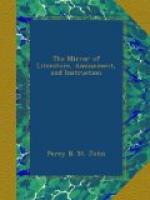“To the Upper Classes of society, then, I would say, that the question no longer is whether or not the people shall be instructed—for that has been determined long ago, and the decision is irreversible—but whether they shall be well or ill taught—half informed or as thoroughly as their circumstances permit and their wants require. Let no one be afraid of the bulk of the community becoming too accomplished for their superiors. Well educated, and even well versed in the most elevated sciences, they assuredly may become; and the worst consequence that can follow to their superiors will be, that to deserve being called their betters, they too must devote themselves more to the pursuit of solid and refined learning; the present public seminaries must be enlarged: and some of the greater cities of the kingdom, especially the metropolis, must not be left destitute of the regular means within themselves of scientific education.
“To the Working Classes I would say, that this is the time when by a great effort they may secure for ever the inestimable blessing of knowledge. Never was the disposition more universal among the rich to lend the requisite assistance for setting in motion the great engines of instruction; but the people must come forward to profit by the opportunity thus afforded, and they must themselves continue the movement once begun. Those who have already started in the pursuit of science, and tasted its sweets, require no exhortation to persevere; but if these pages should fall into the hands of any one at an hour for the first time stolen from his needful rest after his day’s work is done, I ask of him to reward me (who have written them for his benefit at the like hours) by saving threepence during the next fortnight, buying with it Franklin’s Life, and reading the first page. I am quite sure he will read the rest; I am almost quite sure he will resolve to spend his spare time and money, in gaining those kinds of knowledge which from a printer’s boy made that great man the first philosopher, and one of the first statesmen of his age. Few are fitted by nature to go as far as he did, and it is not necessary to lead so perfectly abstemious a life, and to be so rigidly saving of every instant of time. But all may go a good way after him, both in temperance, industry, and knowledge, and no one can tell before he tries how near he may be able to approach him.”
We may here mention that in 1825, Lord Brougham was elected Lord Rector of the University of Glasgow; his opponent, Sir Walter Scott, lost the election by the casting vote of Sir James Mackintosh, in favour of Lord Brougham.
Among the originators of the London University, Lord Brougham occupies a foremost rank, and partly by the aid of his indefatigable talents, that establishment was opened, in 1828, within seventeen months from the day on which the first stone was laid.




